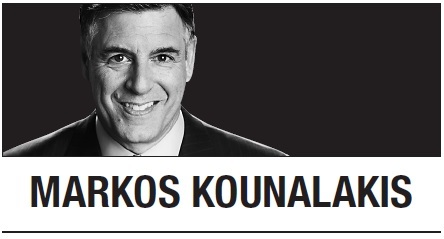[Markos Kounalakis] Trump’s right: Nuke deals are for suckers
By Korea HeraldPublished : Oct. 9, 2017 - 17:21
 Nuke deals are all the rage these days. The United Nations sees nuclear accords as a path to world peace. President Barack Obama worked toward a “global zero” nuclear-free future.
Nuke deals are all the rage these days. The United Nations sees nuclear accords as a path to world peace. President Barack Obama worked toward a “global zero” nuclear-free future.President Donald Trump, on the other hand, is highly skeptical of deals with Iran and North Korea because he understands what Tehran and Pyongyang leaders already know: Nuclear disarmament deals are for suckers.
Countries generally balk at giving up their hard-won and expensive nuclear capabilities because nuclear weapons are a time-tested and reliable deterrent. Giving up these weapons requires faith that any agreement inked is rock solid and that the countries agreeing to unilateral nuclear disarmament are assured they will not wind up like Ukraine or Libya -- invaded or overthrown.
Trump does not inspire this faith. Neither does he have faith that the other side will do as it’s told.
That’s why the Iran deal may soon get scrapped and why Trump tweeted at Secretary of State Rex Tillerson to stop “wasting his time” working to negotiate one with Kim Jong-un. Depending on unpredictable policy pronouncement or stated goals, treaty breakdowns could lead to a Middle East arms race or a reignited North Korean conflict.
If the Iran deal is broken by the United States, there will certainly not be a North Korean deal, or any future deals with rising nuclear states, because foreign leaders will instantly have evidence of what they have always suspected: These agreements are a trap. A deal must be worth more than the paper on which it is written. And history shows, it is not.
Trump already has dumped the Trans-Pacific Partnership, withdrawn from the Paris climate accords, and decided -- but not announced -- whether to recertify the Iran deal. Every agreement, treaty, commitment and pinky promise made by America is now in question. A few months back, even NATO wondered if collective defense -- the main premise of the treaty organization -- was on the table.
“Global statecraft relies on trust, reputation and credibility, which can be all too easily squandered,” wrote my Hoover Institution colleague, former Secretary of State George Schultz, in making the business case for sticking with the Paris climate deal. “If America fails to honor a global agreement that it helped forge, the repercussions will undercut our diplomatic priorities across the globe.” North Korean nuclear disarmament is one of those priorities.
Putin, like Trump, does not concern himself with previously done deals, convention or expectation. In 1994, the Budapest Memorandum was signed by the US, UK, Russia and Ukraine. When the Soviet Union dissolved, Ukraine had the world’s third-largest nuclear arsenal and the memorandum called for all 1,900 nuclear weapons to be moved to and disassembled in Russia. In exchange for the nukes, the parties all agreed to “respect the independence and sovereignty and existing borders of Ukraine,” including Crimea, of course, and to “refrain from the threat or use of force” in the post-Soviet country.
What is the likelihood that Putin would have invaded, occupied and annexed all of Crimea or started a hybrid war in Ukraine’s Donbass region if Kiev still controlled its arsenal? Zilch.
The lesson learned by other aspiring nuclear powers? It pays to have nukes.
Putin is not the only double-crosser. NATO’s duplicity in Libya provides a lesson for potential disarmament partners. It is impossible to defend Gadhafi’s murderous rule or to be critical of the sense of urgency and humanitarian impulse for regime change felt by the world and led by France and Britain. But here, too, dictators and despots grew to understand that even a disarmament deal with the West is not a guarantee of survival. Gadhafi gave up his weapons of mass destruction and nuclear weapons program in 2003 and, in return, saw painful sanctions removed and received an invitation to join the international community. Then he was killed. Long story short, it was a bad deal for him personally. The country has not fared that well, either.
That all happened way back when Obama was president, but dictators have pretty good memories. As a result, North Korea’s Kim is looking closely both at bad precedents and Trump’s potentially reneging on the relatively fresh Iran nuclear deal.
Iran is key. If Trump grudgingly recertifies the despised Iran deal for a third time, then maybe North Korea might be open to negotiating away its own nukes. Unlikely, but possible. Especially with a little stiff prodding from Beijing.
All indications are that Iran, despite its reprehensible regime and human rights violations both at home and abroad, is following the deal’s conditions. Under those circumstances, Trump’s team favors recertification. Secretary of Defense James Mattis -- Disclosure: Mattis is also a Hoover colleague -- just told Congress that the US needs to stick with the Iran deal. A still-serving Secretary Tillerson concedes, “Iran is in technical compliance with the agreement,” even though he holds his nose and believes Tehran is violating the accord’s “spirit.”
Trump may be trying to imitate Mohammed Ali and aggressively “rope-a-dope” Kim into a nuclear deal. The president’s global reputation, however, as a sometimes (to some people) charming but blunt prevaricator is not likely to trick Kim into an act of self-toppling political suicide.
Which means that Trump might just do as he tweets by ordering a pre-emptive strike on Kim to try to land a sucker punch.
By Markos Kounalakis
Markos Kounalakis is a senior fellow at Central European University and visiting fellow at the Hoover Institution. -- Ed.
(Tribune Content Agency)
-
Articles by Korea Herald




![[Herald Interview] 'Amid aging population, Korea to invite more young professionals from overseas'](http://res.heraldm.com/phpwas/restmb_idxmake.php?idx=644&simg=/content/image/2024/04/24/20240424050844_0.jpg&u=20240424200058)












![[KH Explains] Korean shipbuilding stocks rally: Real growth or bubble?](http://res.heraldm.com/phpwas/restmb_idxmake.php?idx=652&simg=/content/image/2024/04/25/20240425050656_0.jpg&u=)

